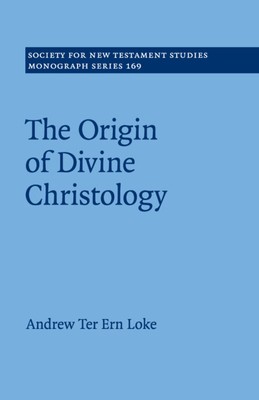
- We will send in 10–14 business days.
- Author: Andrew Ter Ern Loke
- Publisher: Cambridge University Press
- ISBN-10: 1316648753
- ISBN-13: 9781316648759
- Format: 14 x 21.6 x 1.5 cm, minkšti viršeliai
- Language: English
- SAVE -10% with code: EXTRA
Reviews
Description
In recent years, there has been considerable debate concerning the origin of divine Christology. Nevertheless, the proposed theories are beset with problems, such as failing to address the evidence of widespread agreement among the earliest Christians concerning divine Christology, and the issues related to whether Jesus' intention was falsified. This book offers a new contribution by addressing these issues using transdisciplinary tools. It proposes that the earliest Christians regarded Jesus as divine because a sizeable group of them perceived that Jesus claimed and showed himself to be divine, and thought that God vindicated this claim by raising Jesus from the dead. It also provides a comprehensive critique of alternative proposals, and synthesizes their strengths. It defends the appropriateness and merits of utilizing philosophical distinctions (e.g. between ontology and function) and Trinitarian concepts for explaining early Christology, and incorporates comparative religion by examining cases of deification in other contexts.
EXTRA 10 % discount with code: EXTRA
The promotion ends in 22d.19:02:51
The discount code is valid when purchasing from 10 €. Discounts do not stack.
- Author: Andrew Ter Ern Loke
- Publisher: Cambridge University Press
- ISBN-10: 1316648753
- ISBN-13: 9781316648759
- Format: 14 x 21.6 x 1.5 cm, minkšti viršeliai
- Language: English English
In recent years, there has been considerable debate concerning the origin of divine Christology. Nevertheless, the proposed theories are beset with problems, such as failing to address the evidence of widespread agreement among the earliest Christians concerning divine Christology, and the issues related to whether Jesus' intention was falsified. This book offers a new contribution by addressing these issues using transdisciplinary tools. It proposes that the earliest Christians regarded Jesus as divine because a sizeable group of them perceived that Jesus claimed and showed himself to be divine, and thought that God vindicated this claim by raising Jesus from the dead. It also provides a comprehensive critique of alternative proposals, and synthesizes their strengths. It defends the appropriateness and merits of utilizing philosophical distinctions (e.g. between ontology and function) and Trinitarian concepts for explaining early Christology, and incorporates comparative religion by examining cases of deification in other contexts.


Reviews